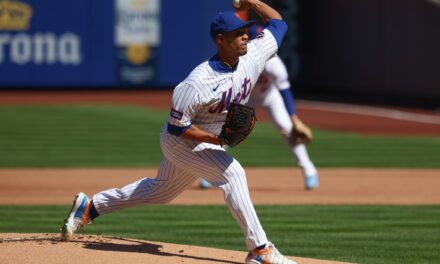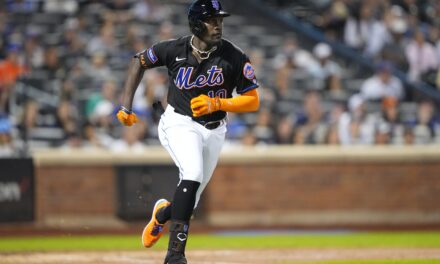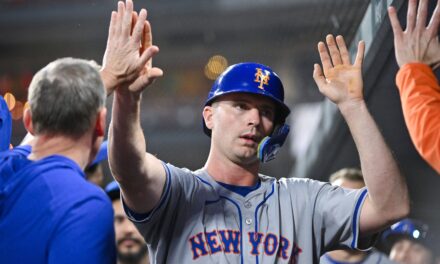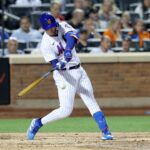Angel Pagan had what looked to be a tremendous season for the Mets in 2010. When the news broke that Carlos Beltran would miss a considerable chunk of time and miss the start of the season, Pagan stepped right in as he did in 2009 and gave the Mets more than anyone expected. In 151 games he batted .290 with 31 doubles, 7 triples and 11 home runs. He also scored 80 runs while swiping 37 bases. He was the team’s best defensive outfielder as well. All that for the rock bottom price of $1.5 million dollars.
Every baseball season teaches us all something new. Last season, I learned what many have been preaching to me for years, and that is the importance of on-base percentage. The final exam for my course on OBP, came in the form of Jeff Francoeur, a player who I loved from the first day he joined the Mets in July of 2009, and pretty much all through his Mets tenure. As his final days with the team were dwindling down, the swings and misses and lack of patience at the plate really had started to wear down my patience with him, until I finally exhausted all of it while watching him play as a Texas Ranger.
I still believe Frenchy was great in the clubhouse and an integral part of the team dynamic, but on the field he did little to improve as a player. No matter what advice his coaches and fellow players gave him, he would ultimately resort to his free swinging ways. I held out hope for him longer than most because he was only 27, but even I had to finally admit that his value on offense was limited and that he wasn’t nearly half as good as his charm in the dugout.
My fascination with Francoeur led me to the conclusion that on-base percentage is as important a factor in evaluating a player than home runs and RBI totals. During the World Series, Joe Buck mentioned in the bottom of the seventh, that the Rangers had just nine outs left to try and mount a comeback. I started counting those outs and saw so many of them wasted on first pitch swinging. Finally there were no outs left for the Rangers, and the San Francisco Giants won the World Series. For the first time I viewed the game in a way that I’ve never done while watching a Mets game. It was apparent to me now that minimizing outs is indeed a critical part of the dynamic of being productive as a player and winning as a team. We only get 27 of them per nine inning game, and it is important not to squander them if you can help it. That’s where OBP comes in. Getting on-base any way you can and as much as you can increases your odds of scoring, preserves outs, and guarantees the player batting behind you an at-bat. It prolongs the inning, tires the opposing pitcher and puts more pressure on the defense, all of which are key elements when your team is at-bat and needs to score runs.
Sorry for the detour, but I needed to establish that before making my next point. Getting back to Francoeur, and more importantly Angel Pagan. I looked at Frenchy’s career OBP which stands at a woeful .296. Among starting right fielders in the last five years, it ranks as the worst in baseball. I don’t know what the baseline is for a good OBP, but I would say that .330 would be a minimum standard. League averages in 2010 were .327 in the AL, and .324 in the NL.
Taking a closer look at Angel Pagan’s splits, I discovered data that would indicate to me that it would be better for the Mets to use Pagan in a platoon role instead of an everyday right fielder or center fielder.
In this first chart I created on Baseball Reference, it shows that Pagan’s on-base percentage was just .298 against left handed pitching in 2010.
2010 Splits
| Split | G | AB | H | RBI | BB | |||
|---|---|---|---|---|---|---|---|---|
| vs RHP as LHB | 140 | 436 | 131 | 49 | 34 | .300 | .351 | .787 |
| vs LHP as RHB | 77 | 142 | 37 | 20 | 8 | .261 | .298 | .692 |
I wondered if this was just a fluke or maybe just a tough year for him against southpaws. So I took a look at his career splits as well.
Career Splits
| Split | G | AB | H | RBI | BB | |||
|---|---|---|---|---|---|---|---|---|
| vs RHP as LHB | 351 | 927 | 278 | 98 | 75 | .300 | .351 | .796 |
| vs LHP as RHB | 210 | 403 | 101 | 55 | 27 | .251 | .294 | .708 |
It clearly illustrates that the Mets would probably be able to maximize their offensive output at right field, if they were able to platoon Angel Pagan with a right handed bat, preferably one with some power.
The Mets have a few outfielders who appear to be major league ready in Lucas Duda, Fernando Martinez and Chris Carter. But unfortunately, they are all left-handed sluggers.
In fact the only right handed hitting outfielder currently on the Mets 40 man roster, is Jason Bay who of course will be playing leftfield in 2011.
I took a look at some of the players hitting free agency this week and I saw one name that popped out at me, our old friend, Xavier Nady.
Nady’s value plunged after surgery on his elbow, but he showed signs of returning to form for the Cubs late last season.
Against left handed pitching, Nady has some impressive numbers in his career.
| Split | G | AB | H | HR | RBI | BB | ||||
|---|---|---|---|---|---|---|---|---|---|---|
| vs LHP as RHB | 351 | 725 | 215 | 23 | 97 | 69 | .297 | .367 | .451 | .818 |
He was already being used in a platoon role last season, so he should have no problems adjusting. He can also spell Ike Davis at first base against a tough lefthanded pitcher or just to give him the occasional day off. His bat would be nice coming off the bench as well.
That .367 on-base percentage and .818 OPS would look really good in our lineup against southpaws, perticularly in lieu of Pagan. Nady gives you 70 points more in OBP and over 100 more points in OPS.
He shouldn’t cost an arm and a leg to acquire, and we already know he can play in New York and ad some charcter to the clubhouse.
What are your thoughts?














